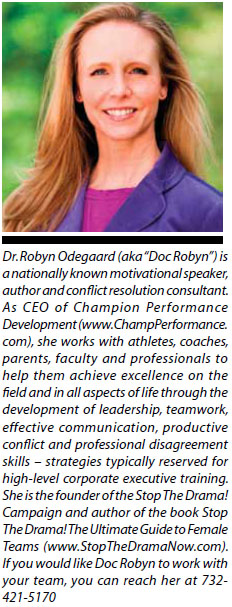|
Understanding Leadership on Female Teams
If this sounds like your team don't worry, it is perfectly normal. Once you understand what is going on you can provide your athletes with the skills to Stop The Drama! and focus their energy on reaching their full potential as individuals and as a team. Why does it happen? The short answer — women have different Communication DNA than men. If you go back to the dawn of human beings, a man's role was to hunt and protect his family. To do so effectively he needed to be strong and healthy. If he was injured physically, he can no longer do his job. Thus the best way to convince a man that he needed to see things a certain way was to injure him physically. And the best way to become a 'winner' after losing would be to align himself with the winner. It is a very "king of the jungle" way of looking at things. He who wins gets his way. He who loses shuts up and lines up. We still see that very clearly on male teams today. Since the dawn of time things have been very different for women. If it wasn't hunting or protecting, a woman was doing it. There is no way a woman could do all of the tasks herself. She needed the help of the other women in the "cave-complex." Injuring a woman physically would only give the group one more person to take care of and two less hands to do work. That would be counterproductive. However, convince the group she is bad and push her out and suddenly the resources her family was using are available for your family. In that case gossip, backstabbing, and bickering become useful tool. Obviously that is a simplification. But it makes the point very clear that women use language differently than men. What they expect from their teammates, how they lead/follow, how conflict is addressed, or ignored, and how they communicate information originates from a different place than on male teams. Telling a female team to "leave it at the gate," "shut-up and play" or "don't take it personally" isn't going to help. They need to understand female communication, be taught how to engage in productive conflict and resolve disagreements before they become a team-wide problem. There are many teams giving up W's before they ever set foot on the field because they don't know how to lead, follow or get out of the way. Here are a few skills you can share with your athletes to support the use of productive conflict:
One final note — you can't expect your athletes to use these skills if you and your coaching staff aren't using them. How does your coaching staff lead? Do disagreements with parents, umps or the facilities manager result in yelling or complaining behind people's back? Athletes learn from observation. The best you can expect from them is what you do yourself.
|
|
|







